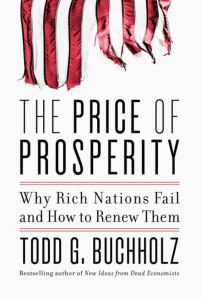
Todd G. Buchholz, Top Economist and Best-Selling Author, Says Nations That March Together Should Trade Together
LOS ANGELES, CA, UNITED STATES, September 25, 2024 /EINPresswire.com/ -- Donald Trump and Kamala Harris agree on little except a disdain for free trade, says Todd G. Buchholz, leading economist and best-selling author. The 2024 presidential campaign is breaking into a bidding war over tariffs – who can jack them up highest. Mr. Trump threatens a 10% across the board tariff, while Ms. Harris voted against Mr. Trump’s NAFTA rewrite, claiming it was not hard-nosed enough. The free-trade mood of the 1980s and 1990s has vanished in Washington, and this scares other countries, which know the U.S. – despite wobbles and foibles – remains the shiniest opportunity in the world, Buchholz states.
Free-trade economists should try to fight the anti-trade wave with facts, but there’s a more urgent task: given the powerful antipathy, what principle should guide policy? Buchholz proposes the following: Nations whose armies march and drill together should trade together, too. Rather than slam shut border gates for goods everywhere, the U.S. must be able to discern between good players on the world stage and bad players.
Since the financial crash of 2008, trade as a proportion of the U.S. economy has shrunk by about 10%, says Buchholz. The blunt fact is the U.S., with its vast 335-million-person internal market, can handle trade wars and skirmishes better than most other nations. Since the 2008 meltdown, U.S. GDP has outpaced every G7 country, and has left even Chinese officials wondering where they’ve gone wrong, Buchholz contends.
According to Buchholz, the anti-globalization attitude seems to treat all foreigners alike, imagining that they are all trying to steal jobs, swipe intellectual property, and take advantage of any loopholes and cracked doors. As a result, trade warriors in the U.S. can get just as worked up over butter and maple syrup from Canada as bomb components reaching North Korea. The U.S. conducts dozens of joint training maneuvers with the Canadian armed forces and, of course, none with North Korea. The more we train with another army, the more open we should be on trade. Countries like Australia, the UK, Japan, and Germany should be at the top of the list, alongside Canada, suggests Buchholz.
When President Biden took office, most pundits assumed he would reverse just about every policy of his predecessor, including the principles of Trump’s trade ambassador Robert Lighthizer. Instead, Biden embraced Donald Trump’s restrictions but without a consistent regard for national security. In fact, some of his moves were both baffling and alarming. For example, Biden hiked tariffs on Canadian lumber and shut down that country’s Keystone pipeline, yet relaxed oil export constraints on Iran, and even freed up $6 billion in frozen funds, which Iran put to use to menace allies through its Hezbollah and Houthi proxies, explains Buchholz.
Buchholz points out that the administration’s border policy has fueled even more antipathy towards trade. After all, many Americans figure that if the federal government did not notice 1.8 million “got-away” (yes, that’s the official term) migrants crossing the Southern border, how can we trust it with 20 million uninspected corrugated steel containers arriving on ships from who-knows-where? If Washington cannot be trusted to mind pedestrians, how can it mind engine pistons marked “Toronto,” which might have originated in Tianjin?
While history teaches that world trade makes nations richer, is it possible that we do not want certain countries to grow richer? Buchholz ponders. 'We now see that success in world trade can inflame, not just enriched," he says. Is a richer China in the interest of the U.S. at this moment in time? China’s threats to Taiwan, construction of artificial islands, confrontations with Japan, and overt pledges to dominate the world economy harken back to Nikita Khrushchev’s warning, “We will bury you.”
Buchholz emphasizes that whoever wins the White House in November must learn to tie national security to economic security. At this time, the U.S. is vulnerable in a number of spheres: precious semiconductor equipment lies in Taiwan one hundred miles from the China’s coast and within striking range of its Navy’s catamarans, not to mention its new aircraft carriers; China and Russia gained a head start in hypersonic missiles, which fly faster than the speed of sound; and Russian and Iranian proxies in the Red Sea and the Strait of Hormuz continually menace trading routes by launching missiles and drones, and even funding pirates, who are far more lethal than Johnny Depp’s eyelined character in the Caribbean. In the past year, Red Sea commercial traffic dropped by half, forcing ships to steam 6,000 miles further and ten days longer around Africa to reach their destinations. Supply chain worries continue to nag businesses long after Covid masks came off, he adds.
No one needs to be convinced that the world has grown more dangerous. On any given night, newscasts can show missiles launching from Lebanon, Crimea, or Pyongyang. But it is even more dangerous if our international economic policy cannot discern between unfriendly fire and friendly competition. Buchholz concludes, "We should trade with those who march in step with us literally on battlefields and metaphorically in defense of democracy."
Mr. Buchholz is a former White House director of economic policy and managing director of the Tiger hedge fund. He is the author of “New Ideas from Dead Economists.”
For more information about Todd G. Buchholz, please click here.
Amanda Kent
Boundless Media USA
+1 313-403-5636
email us here
Distribution channels: Book Publishing Industry, Business & Economy, Consumer Goods, Media, Advertising & PR, Social Media
Legal Disclaimer:
EIN Presswire provides this news content "as is" without warranty of any kind. We do not accept any responsibility or liability for the accuracy, content, images, videos, licenses, completeness, legality, or reliability of the information contained in this article. If you have any complaints or copyright issues related to this article, kindly contact the author above.
Submit your press release


